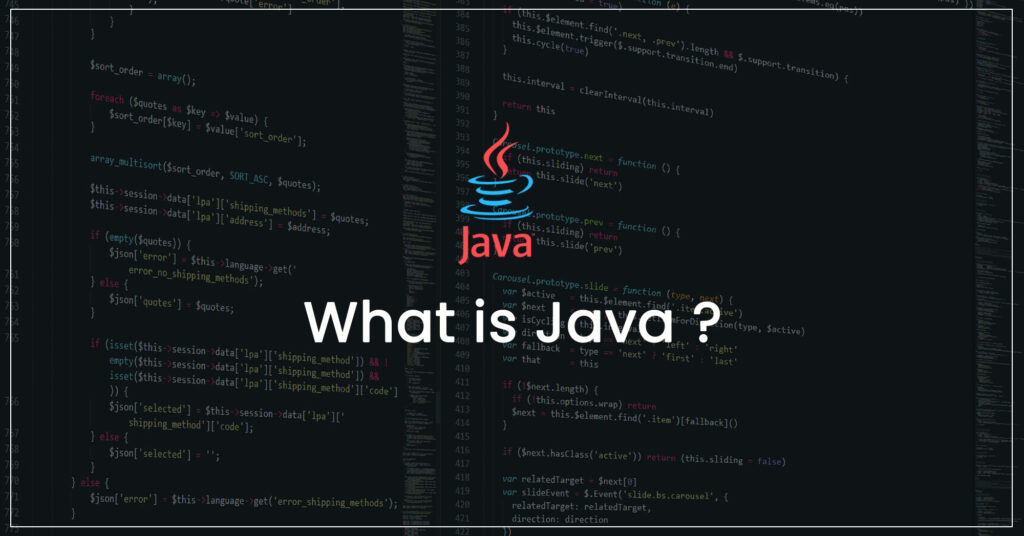Introduction:
Table of Contents
Java is a powerful, class-based, object-oriented programming language that has been ruling the software development industry for over two decades. It was first introduced by Sun Microsystems in 1995 and was later acquired by Oracle Corporation. Java is known for its “write once, run anywhere” slogan, which means that a Java program can run on any device that has a Java Virtual Machine (JVM) installed, regardless of the underlying hardware and operating system.

What is Java?
Java is a object-oriented programming language that is used for developing a wide range of applications, including desktop applications, web applications, mobile applications, and enterprise applications. It is a language that is easy to learn, and contain object-oriented programming language with a simple syntax and clear, concise code. Java has a vast and active community of developers, who continually contribute to its growth and development.

Java Components:
There are three main components of Java: Java SE, Java EE, and JavaFX.
- Java SE: Java Standard Edition is a basic version of Java and is used for developing desktop applications and games.
- Java EE: Java Enterprise Edition is an advanced version of Java and is used for developing enterprise applications, such as e-commerce websites and business software.
- JavaFX: JavaFX is a platform for developing rich Internet applications, such as multimedia and animation-rich applications.
Java Virtual Machine (JVM):
The Java Virtual Machine is a software component that runs on a computer and provides a platform for Java applications to run. JVM interprets compiled Java code and executes it on the computer. The JVM also manages the memory and resources of the computer, ensuring that the Java applications run smoothly and efficiently.
Java Development Kit (JDK):
The Java Development Kit is a software development environment that is used for developing Java applications. It includes tools such as a compiler, a debugger, and libraries, that are necessary for developing Java applications. The JDK also includes the JRE, which is a runtime environment that is necessary for running Java applications.
Object-Oriented Programming (OOP) in Java:
Java is an object-oriented programming language, which means that it is based on the concept of objects. In Java, everything is an object, and objects interact with each other to perform tasks. OOP provides a way of organizing code into reusable and modular components, making it easier to maintain and scale.

Why Choose Java?
There are many reasons why Java is a popular choice for software development:
- Platform Independent: Java has the unique “write once, run anywhere” feature, which makes it platform independent. This means that a Java program can run on any device that has a Java Virtual Machine (JVM) installed, regardless of the underlying hardware and operating system. This allows Java developers to write code once and deploy it on multiple platforms, reducing development time and costs.
- Robust and Secure: Java is known for its robustness and security features. It has a strong type system that helps to prevent common programming errors, and its automatic memory management ensures that memory is efficiently allocated and managed, reducing the risk of memory leaks and other security vulnerabilities. Java also has built-in security features, such as classloaders, that help to prevent malicious code from running on a system.
- Large Community: Java has a large and active community of developers, which means that there is a wealth of resources and support available for Java developers. This includes a vast library of libraries and APIs, as well as forums, blogs, and other online communities where developers can ask for help and exchange ideas. This community-driven development model helps to ensure that Java continues to evolve and meet the changing demands of the software development industry.
- Enterprise-Level Support: Java is widely used in the enterprise world and is a popular choice for developing enterprise-level applications, such as e-commerce websites and business software. Java provides enterprise-level support, including robust security features and scalability, making it a suitable choice for large-scale projects.
- Widely Used: Java is used by millions of developers and organizations around the world, making it one of the most widely used programming languages in the world. This widespread use means that there is a wealth of talent and resources available for Java development, making it easier to find qualified developers and resources for your project.
- Rich Ecosystem: Java has a rich ecosystem, including a vast library of libraries and APIs that developers can use to build and extend their applications. This ecosystem includes popular frameworks, such as Spring and Hibernate, that make it easier to develop and deploy applications, as well as tools, such as Eclipse and IntelliJ, that make it easier to develop and debug code.
- JavaFX: JavaFX is a platform for developing rich Internet applications, such as multimedia and animation-rich applications. JavaFX provides a rich set of graphics and media APIs, making it easier to create visually appealing and engaging applications.
- Mobile Development: Java is a popular choice for mobile application development, including Android app development. The Android operating system is based on Java, and Java provides a robust and flexible platform for developing mobile applications
In conclusion
Java is a powerful object-oriented programming language and versatile programming language that provides a wide range of benefits for software development. Whether you’re developing desktop applications, web applications, mobile applications, or enterprise applications, Java provides the tools and resources you need to build high-quality, robust, and scalable applications. If you’re looking for a programming language that provides enterprise-level support, a rich ecosystem, and a large community of developers, Java is a great choice.